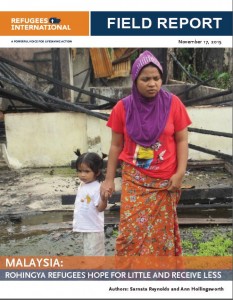Posts Tagged ‘Refugees International’ (7 found)
Malaysia: Rohingya Refugees Hope for Little and Receive Less
 It’s been six months since as many as 1,000 Rohingya fleeing from Myanmar died in the Andaman Sea. And still, neighboring nations remain resistant to recognizing the Rohingya people’s rights as refugees. Even after neighboring governments met earlier this year and agreed to protect the Rohingya at sea, no nation has taken a leadership role in permitting them to disembark from boats safely and legally. The absence of a regional plan leaves the Rohingya vulnerable to the challenges of a perilous sea voyage, and further strands those Rohingya who have lived in Malaysia and other regional nations for up to three generations without legal rights or protection. Without a doubt, Myanmar is creating this crisis […]
It’s been six months since as many as 1,000 Rohingya fleeing from Myanmar died in the Andaman Sea. And still, neighboring nations remain resistant to recognizing the Rohingya people’s rights as refugees. Even after neighboring governments met earlier this year and agreed to protect the Rohingya at sea, no nation has taken a leadership role in permitting them to disembark from boats safely and legally. The absence of a regional plan leaves the Rohingya vulnerable to the challenges of a perilous sea voyage, and further strands those Rohingya who have lived in Malaysia and other regional nations for up to three generations without legal rights or protection. Without a doubt, Myanmar is creating this crisis […]
Myanmar: A Tipping Point for Rohingya Rights?
 Two years after a wave of violence hit the region, Myanmar’s Rakhine State has become a segregated zone. Two million ethnic Rakhine live apart from 1.2 million stateless Rohingya, who are trapped inside displacement camps or barred from leaving their villages. Ending this segregation and protecting the rights of the Rohingya are necessary components of Myanmar’s move toward democracy. However, the Rakhine leadership has rejected – both politically and with force – any reintegration of the two communities, and it is seeking to exclude the Rohingya from any role in the state’s development, distribution of resources, and political representation. […]
Two years after a wave of violence hit the region, Myanmar’s Rakhine State has become a segregated zone. Two million ethnic Rakhine live apart from 1.2 million stateless Rohingya, who are trapped inside displacement camps or barred from leaving their villages. Ending this segregation and protecting the rights of the Rohingya are necessary components of Myanmar’s move toward democracy. However, the Rakhine leadership has rejected – both politically and with force – any reintegration of the two communities, and it is seeking to exclude the Rohingya from any role in the state’s development, distribution of resources, and political representation. […]
Myanmar: Act Immediately to Protect Displaced People’s Rights
As Myanmar continues its renewed engagement with the international community, it must begin to address the serious violations of the rights of ethnic minorities that plague the country. Nearly two years after violence erupted in June 2012, almost 140,000 Muslims (primarily Rohingyas) remain displaced in Rakhine State in conditions of total segregation and marginalization from the Rakhine Buddhist majority. Like the hundreds of thousands of non-displaced Rohingyas in northern Rakhine State, they remain subject to extremely abusive restrictions on their freedom and exposed to violent attacks[…]
• • •UK Must Insist on Commitments from Myanmar President on Minority Rights
Ahead of President Thein Sein’s upcoming visit to London, Refugees International (RI) calls on the British government to demand action from Myanmar on protections for minority groups and citizenship for the stateless Rohingya.
“The British government has been focused on the positive reforms seen under President Thein Sein and the initial steps towards democratization in Myanmar. But these steps are reversible, and it is not in the interests of Myanmar for the international community to ignore the serious human rights abuses that persist in the country,” said RI Senior Advocate Melanie Teff […]
• • •Protecting Minority Rights Is Non-Negotiable
In its rush to normalize relations with Myanmar, the international community – particularly the United Nations – must not ignore the increase in abuses being committed against ethnic minorities in Rakhine and Kachin States, and it must take a stronger stance in defense of the human rights of affected populations. Ten months after violence forced them into displacement […]
• • •Rohingya in Bangladesh: Maintaining the Status Quo; Squandering a Rare Opportunity
For decades, Burmese Rohingya fleeing persecution have sought refuge in Bangladesh. June’s inter-communal violence in Burma’s Rakhine State, as well as subsequent state-sponsored persecution and targeted attacks against Muslim populations […]
• • •Rohingya in Burma: Spotlight on Current Crisis Offers Opportunity for Progress
Despite an abundance of natural resources, Rakhine State is the second-poorest state in Burma. The simmering tension that exists between the Rakhine and stateless Rohingya communities has been stoked by poverty for decades. However, in June 2012 that tension boiled over […]
• • •








 All posts
All posts